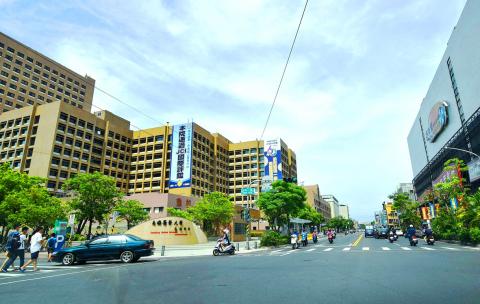Neither Kaohsiung Medical University (KMU) nor National Sun Yat-sen University (NSYSU) may unilaterally decide on a merger of the two after KMU students on Wednesday voted in favor of the plan, the KMU administration said in a statement on Thursday.
In last month’s Evaluation Bimonthly — published by the Higher Education Evaluation and Accreditation Council of Taiwan — NSYSU president Cheng Ying-yao (鄭英耀) proposed a merger between KMU, a private university, and NSYSU, a public institution.
The KMU Alumni Association on March 2 posted a statement on Facebook expressing its strong support for the proposal.

Photo: Lin Yao-wen, Taipei Times
At a KMU Student Association meeting on Wednesday, 695 students voted on the merger. The tally showed 47.2 percent approved of the move, 40 percent had no opinion and 12.8 percent were against it.
In its statement, the KMU administration praised the students for demonstrating a high level of maturity by expressing their opinion through a vote.
However, mergers between public and private universities must comply with government regulations and cannot be invoked by only one of the parties, it said.
Since 2012, the two universities have closely collaborated through a program into which they have invested NT$146 million (US$4.74 million) in research grants. Researchers from the universities have collaborated to publish 1,633 papers. Each semester, the universities decide on a quota for student transfers between them.
The advantages of a merger outweigh the disadvantages, former KMU Alumni Association president Lan Chuan-sheng (藍傳盛) said.
Once merged, the institutes would attract more funding, equipment and resources, Lan said.
There is only a 5 percent overlap between the majors offered by the universities, he said, adding that the two would perfectly complement each other.

‘DENIAL DEFENSE’: The US would increase its military presence with uncrewed ships, and submarines, while boosting defense in the Indo-Pacific, a Pete Hegseth memo said The US is reorienting its military strategy to focus primarily on deterring a potential Chinese invasion of Taiwan, a memo signed by US Secretary of Defense Pete Hegseth showed. The memo also called on Taiwan to increase its defense spending. The document, known as the “Interim National Defense Strategic Guidance,” was distributed this month and detailed the national defense plans of US President Donald Trump’s administration, an article in the Washington Post said on Saturday. It outlines how the US can prepare for a potential war with China and defend itself from threats in the “near abroad,” including Greenland and the Panama

The Chinese Nationalist Party (KMT) is maintaining close ties with Beijing, the Democratic Progressive Party (DPP) said yesterday, hours after a new round of Chinese military drills in the Taiwan Strait began. Political parties in a democracy have a responsibility to be loyal to the nation and defend its sovereignty, DPP spokesman Justin Wu (吳崢) told a news conference in Taipei. His comments came hours after Beijing announced via Chinese state media that the Chinese People’s Liberation Army’s Eastern Theater Command was holding large-scale drills simulating a multi-pronged attack on Taiwan. Contrary to the KMT’s claims that it is staunchly anti-communist, KMT Deputy

RESPONSE: The government would investigate incidents of Taiwanese entertainers in China promoting CCP propaganda online in contravention of the law, the source said Taiwanese entertainers living in China who are found to have contravened cross-strait regulations or collaborated with the Chinese Communist Party (CCP) could be subject to fines, a source said on Sunday. Several Taiwanese entertainers have posted on the social media platform Sina Weibo saying that Taiwan “must be returned” to China, and sharing news articles from Chinese state media. In response, the Mainland Affairs Council (MAC) has asked the Ministry of Culture to investigate whether the entertainers had contravened any laws, and asked for them to be questioned upon their return to Taiwan, an official familiar with the matter said. To curb repeated

A magnitude 4.9 earthquake struck off Tainan at 11:47am today, the Central Weather Administration (CWA) said. The hypocenter was 32.3km northeast of Tainan City Hall at a depth of 7.3km, CWA data showed. The intensity of the quake, which gauges the actual effect of a seismic event, measured 4 in Tainan and Chiayi County on Taiwan's seven-tier intensity scale, the data showed. The quake had an intensity of 3 in Chiayi City and County, and Yunlin County, while it was measured as 2 in Kaohsiung, Nantou County, Changhua County, Taitung County and offshore Penghu County, the data showed. There were no immediate reports of